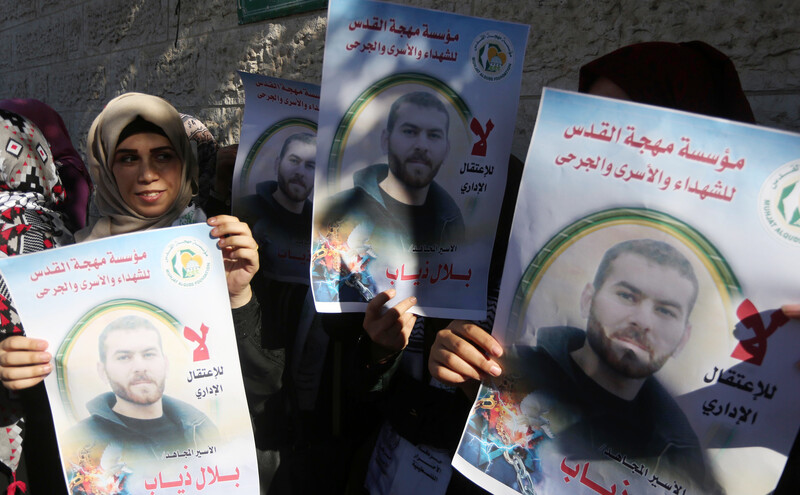Rights and Accountability 14 November 2017

Palestinians in Gaza City hold up posters of Bilal Diab at a protest to show solidarity with Palestinian prisoners held in Israeli jails on 23 October.
APA imagesTwo Palestinian prisoners have entered the critical stages of hunger strikes undertaken in protest at how they have been detained without charge or trial.
Hassan Shokeh, 29, from Bethlehem, has been refusing food for more than 30 days. Shokeh was previously detained by Israeli forces before he was released on 31 August and arrested again less than a month later.
Shokeh has spent a total of 13 years in Israeli prisons. Eight of those years were spent under administrative detention – imprisonment without charge or trial.
Hamza Bouzia, 27, from Salfit in the occupied West Bank, has been on hunger strike for around 30 days. He is also protesting against being placed under administrative detention. He has previously served more than seven years in Israeli prisons.
After three weeks on hunger strike, prisoners are at severe risk of long-term damage to their health and even death. Bouzia and Shokeh are both suffering weight loss, pain, fatigue and cognitive difficulties.
Detention in tents?
Another prisoner began a hunger strike after he was taken into detention last week. Bajis Nakhleh, 53, from Jalazone refugee camp in Ramallah, was arrested in a pre-dawn raid, according to Samidoun, a network supporting Palestinian prisoners.
Nakhleh spent 20 years in Israeli prisons in the past.
A fourth Palestinian prisoner, Bilal Diab, was also on hunger strike for more than 20 days before an agreement was reached with occupation forces to release him on 14 January next year without renewing his administrative detention, according to Wattan TV.
Bilal Diab was protesting administrative detention for the third time. During his most recent hunger strike, the Israeli authorities transferred him and Hassan Shokeh to solitary confinement.
Diab also participated in a mass hunger strike in 2012 when he fasted for 78 days, alongside fellow prisoner Thaer Halahleh. That strike brought them very close to death, as Israel continued to subject them to inhumane and degrading treatment.
He has also conducted a 14-day hunger strike in solidarity with Palestinian prisoner Khader Adnan.
Diab has spent a total of almost 115 days without food, combining his hunger strikes over the years. This has left him with severe health complications, according to Palestinian lawyer Karim Ajwa who recently visited Diab.
In June, the Israeli high court issued a ruling that would increase cell space for prisoners.
The average Israeli cell is three times smaller than the average European one.
Gilad Erdan, Israel’s public security minister, pushed to exclude Palestinians from the ruling, the Tel Aviv newspaper Haaretz reported.
But Israel’s justice ministry blocked Erdan’s efforts.
One idea being discussed to address prison overcrowding is that Palestinians would be detained in tents.
Barred from visit
Meanwhile, the Israeli authorities have canceled all permits for Palestinians from Gaza to visit their imprisoned relatives for the rest of November.
The reasoning behind this move was that renovations were being made in the prisons, Ma’an News Agency has reported.
Israel has also banned the entry of seven members of a 20-strong European delegation planning to visit Marwan Barghouti, Salah Hamouri and other Palestinian prisoners, according to Haaretz. The Israeli authorities have claimed they have been denied entry as they supported the Palestinian-led boycott, divestment and sanctions movement.
The group of visitors from Europe includes mayors and members of parliament.
Tags
- hunger strike
- Palestinian prisoners
- political prisoners
- Bilal Diab
- Hassan Shokeh
- Hamza Bouzia
- administrative detention
- Wattan TV
- Ma'an News Agency
- Gilad Erdan
- israeli high court
- Marwan Barghouti
- Salah Hamouri
- Association for Civil Rights in Israel
- Israeli Ministry of Interior
- Israeli ministry of justice




